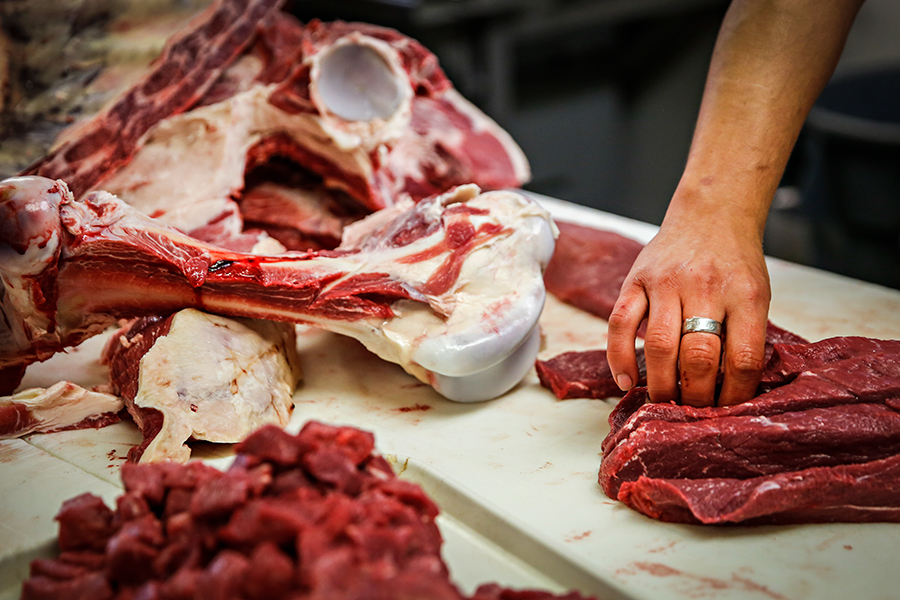Pressure to Process
Meat processors across the state are struggling to keep up with the high demand for local meat following nationwide food supply disruptions amid the pandemic
By Maggie Dresser
Roughly 50 years ago, local meat processor Jeremy Plummer’s grandfather worked in Kalispell as a butcher and started processing his neighbor’s animals on his 40-acre farm in the lower valley as a side job.
As local demand gradually grew, he started Lower Valley Processing in 1974, leaving his butcher job and running the business full-time out of a three-car garage. Since then, the facility has grown with new buildings and new infrastructure with 20 employees as the demand for local meat continues to grow.
Now, the family business is busier than ever amid the coronavirus pandemic. Plummer slaughters, cuts and wraps beef, pork, lamb and wild game for individuals and businesses in the Flathead Valley, which they are able to resell to consumers if they choose.
Since coronavirus outbreaks prompted large-scale meat processing facilities to close down shortly after the pandemic began this spring, livestock began backing up in lots, creating a supply chain disruption and resulting in nationwide meat shortages.
“It’s given the opportunity for producers, such as small producers in the Flathead Valley, to have a consumer base, and that consumer base for local products has skyrocketed,” Plummer said.
While Plummer is always busy and regularly turns business away, he says he’s never seen the demand this high. Lower Valley Processing is booked out two years, and Plummer feels pressured to keep up and feed the valley. Every week, Plummer fills all 70 meat hooks, his freezers are full and every employee is working overtime.
“It just makes a giant hurdle and everybody’s working hard to keep up with it,” Plummer said. “Everybody’s feeling the same strain.”
Despite the demand, there aren’t very many meat processors or people with those skillsets in the state, and Plummer says it’s a tough business to get into with government regulations. What was once a high-paying job, skilled butchers are hard to come by these days.
But this summer, Plummer was awarded a $150,000 state grant to expand his business, which he plans to use for a new septic system. In August, the Montana Meat Processing Infrastructure Grant program awarded $7.5 million to 62 different processors across the state, followed by a second round of $4.2 million this month to expand meat-processing infrastructure in response to the food supply disruption.
Montana Department of Agriculture Director Ben Thomas says 80-90% of Montana beef is shipped to large-scale packers in the Midwest, but once COVID-19 outbreaks forced temporary closures, the cattle had nowhere to go.
“It really exposed some major faults in our food supply system,” Thomas said. “We’ve been wanting to expand local processing for some time and there’s a number of barriers to that. This brought it to the forefront. We had a situation where consumers were paying more at the grocery store for meat while their neighbor rancher was going out of business.”
Stampede Packing Company in Kalispell was one of the recipients in the most recent round of grants in September, and owner Lynmarie Maves plans to put the $142,700 award toward a new $30,000 square-foot building and new equipment to increase smoked sausage packaging.
“We’ve definitely had an increase in demand,” Maves said. “I would say at least 10% increase in sales across the board.”
Plummer is hopeful the grant program will relieve some strain on meat processors across the state and speculates many will use the funding for more equipment to increase production.
But while he’s grateful for the grant and sees the need for expansion, he says he doesn’t want his business to grow too large.
“I personally want to keep it small enough to where it still has a personal touch and quality,” he said. “I don’t want to get so big that I can’t keep an eye on things.”
Pandemic aside, Plummer says there’s also a growing interest in having high-quality, local Montana meat and consumers like the idea of knowing where their food came from. But processors are feeling pressured to keep up.
“I think people are realizing that they appreciate the local touch,” Plummer said. “They know what they’re eating, who they got it from and they know who they are supporting.”